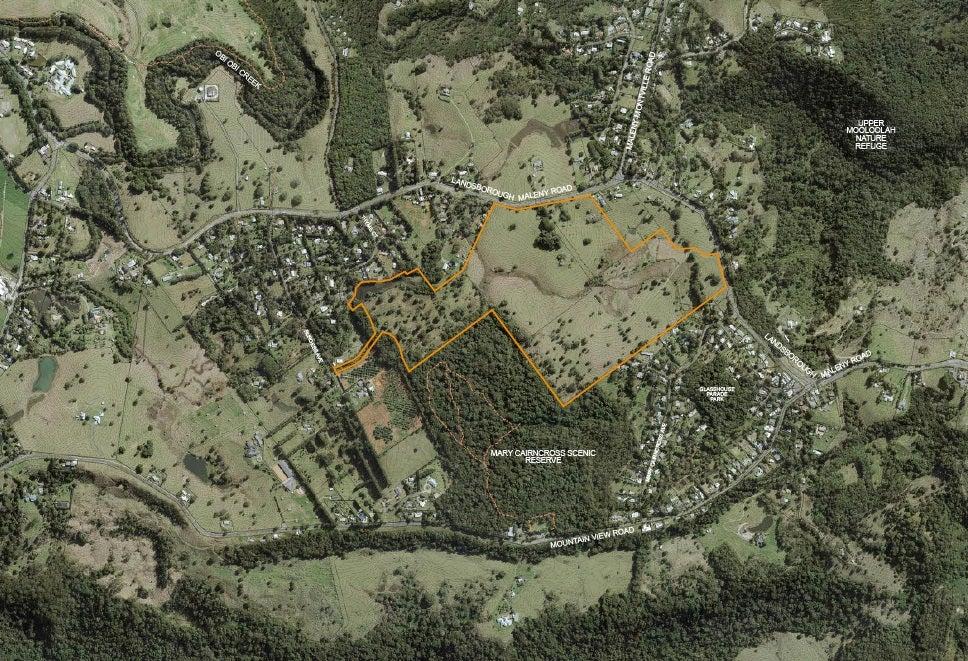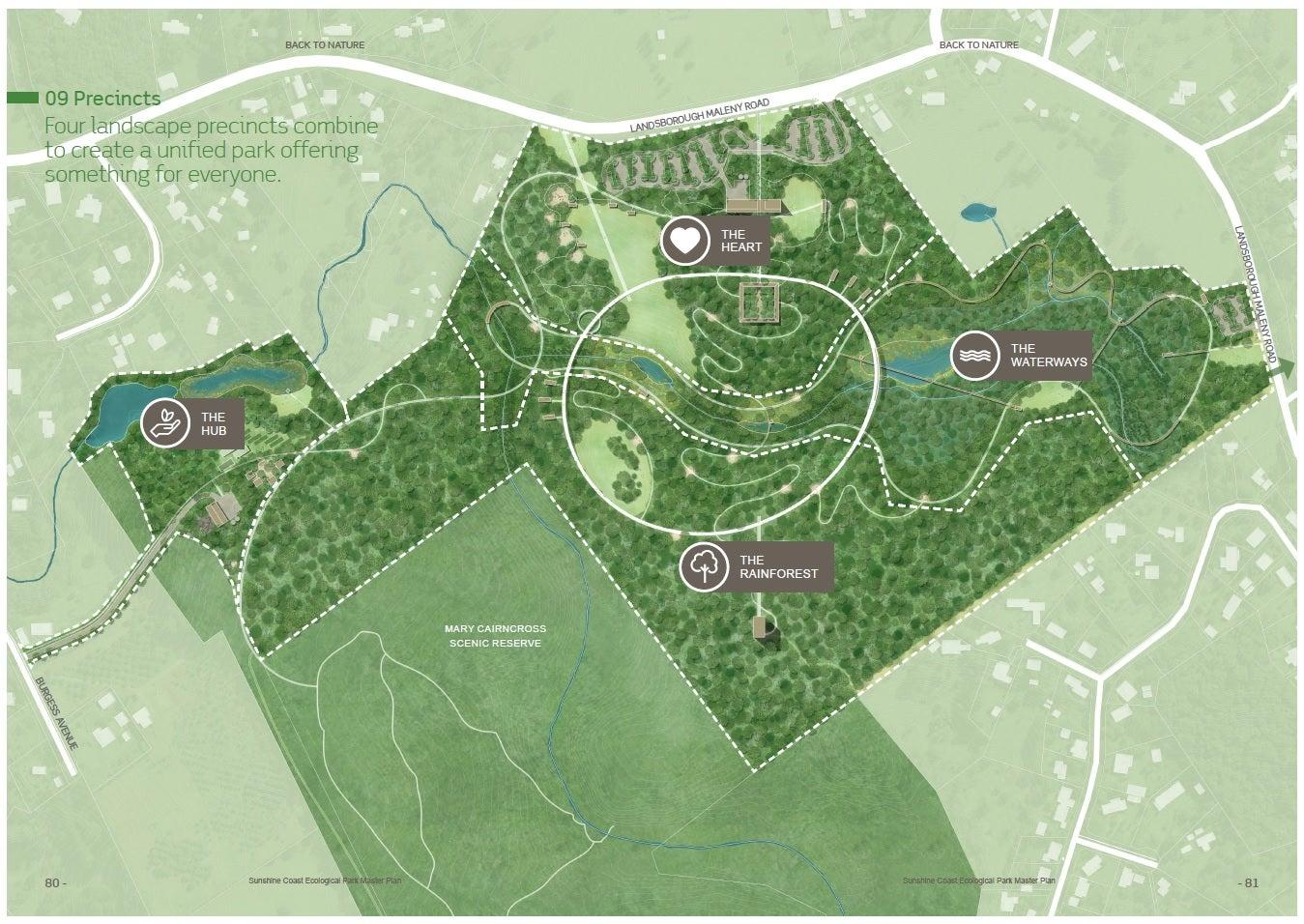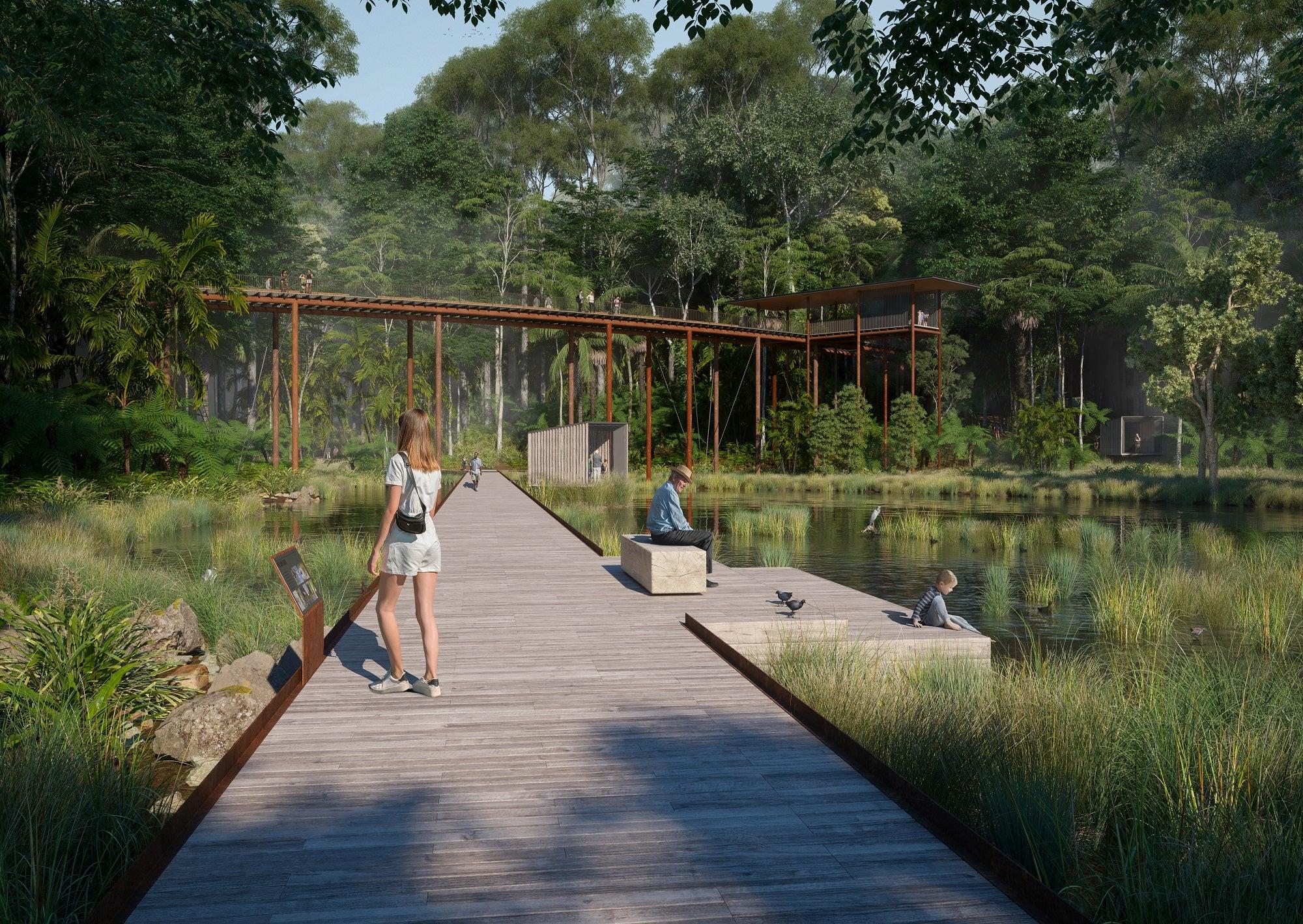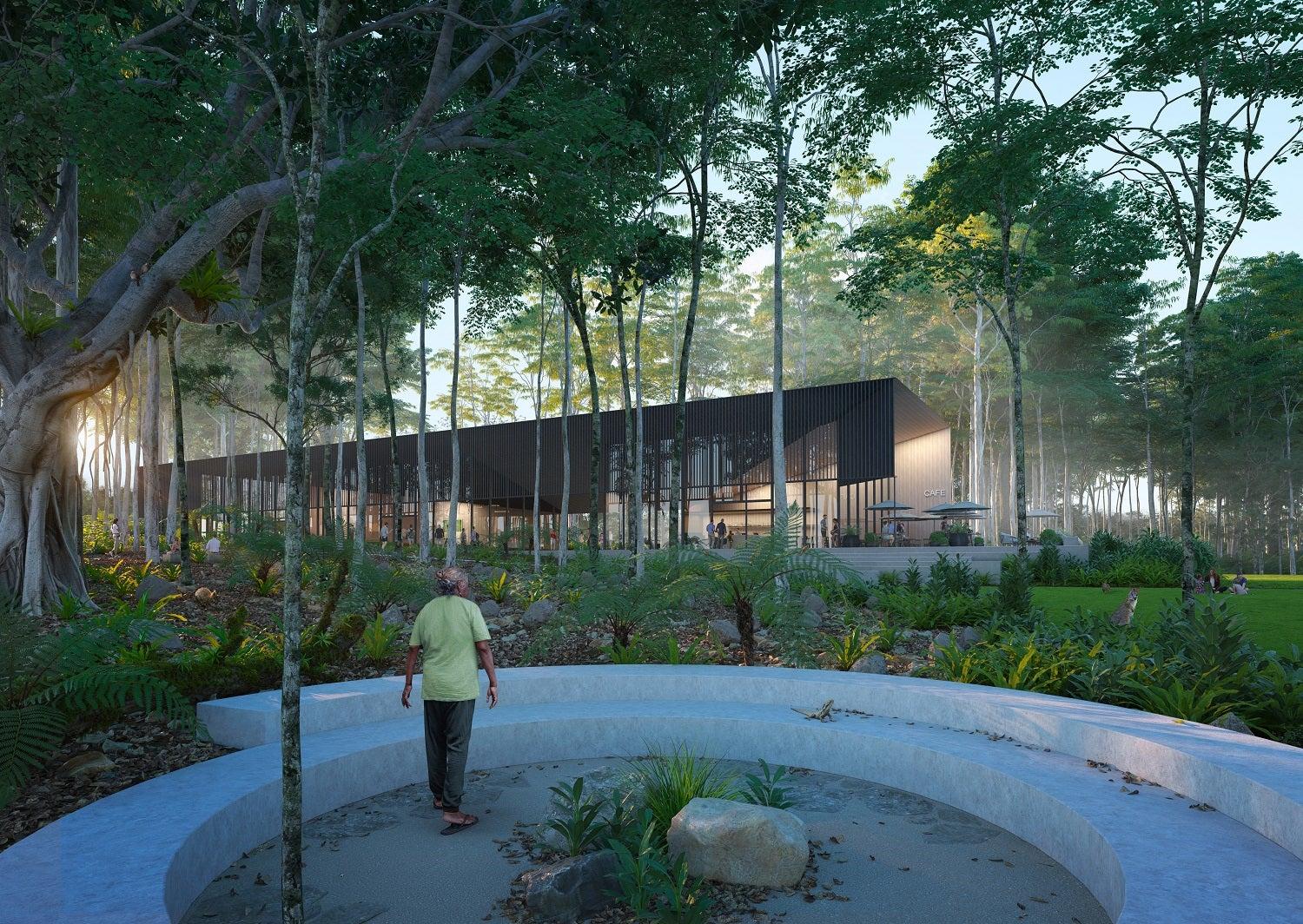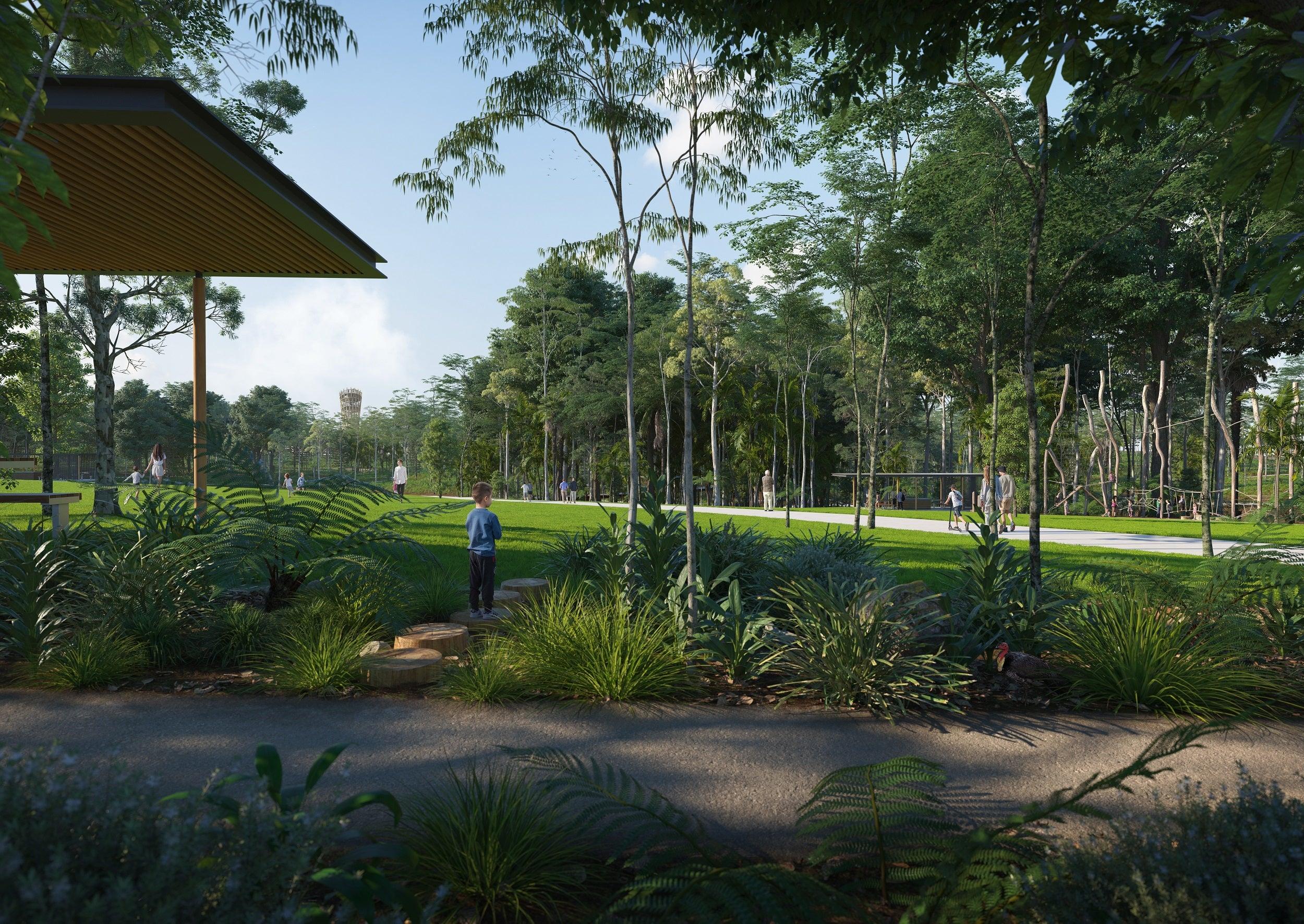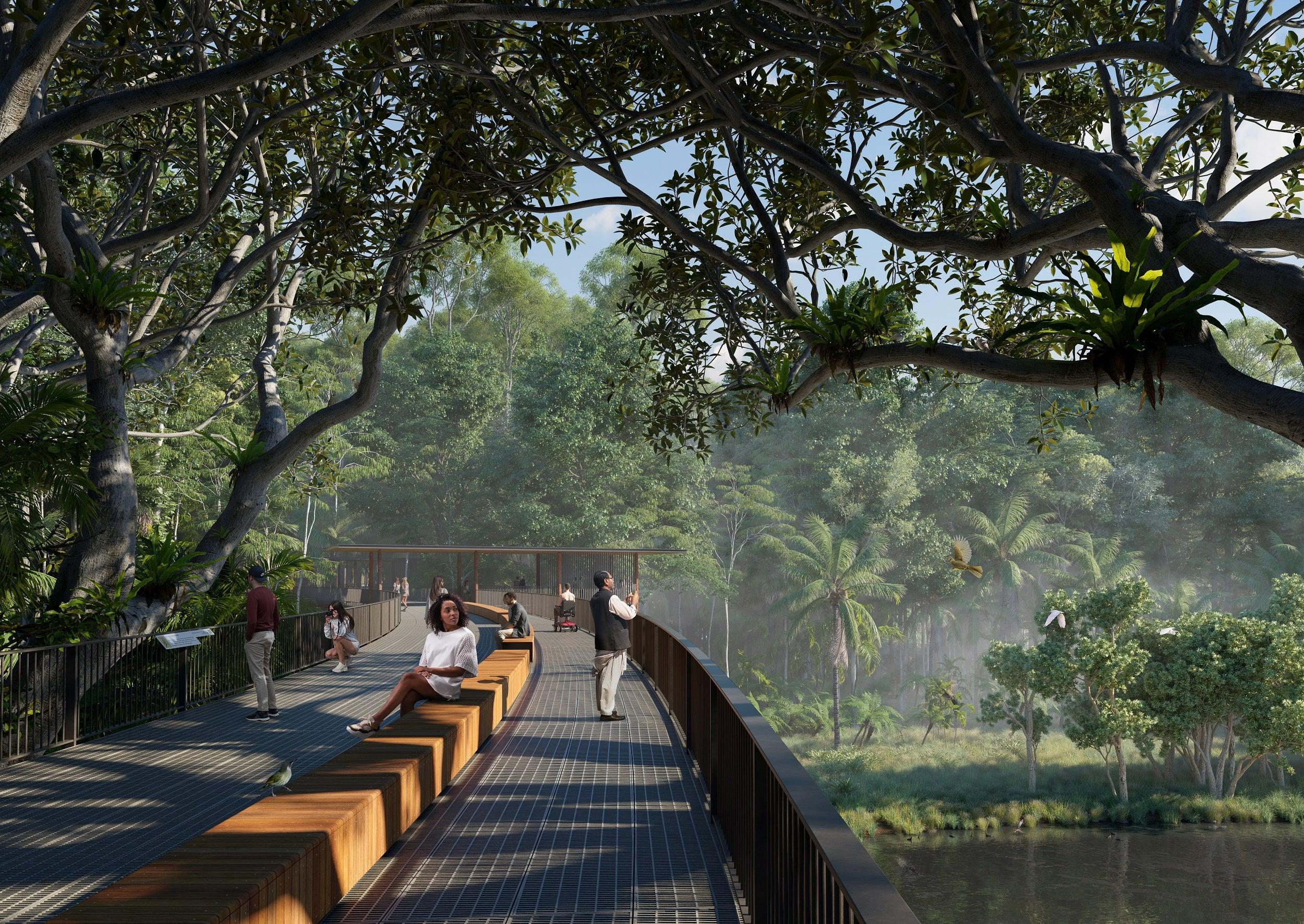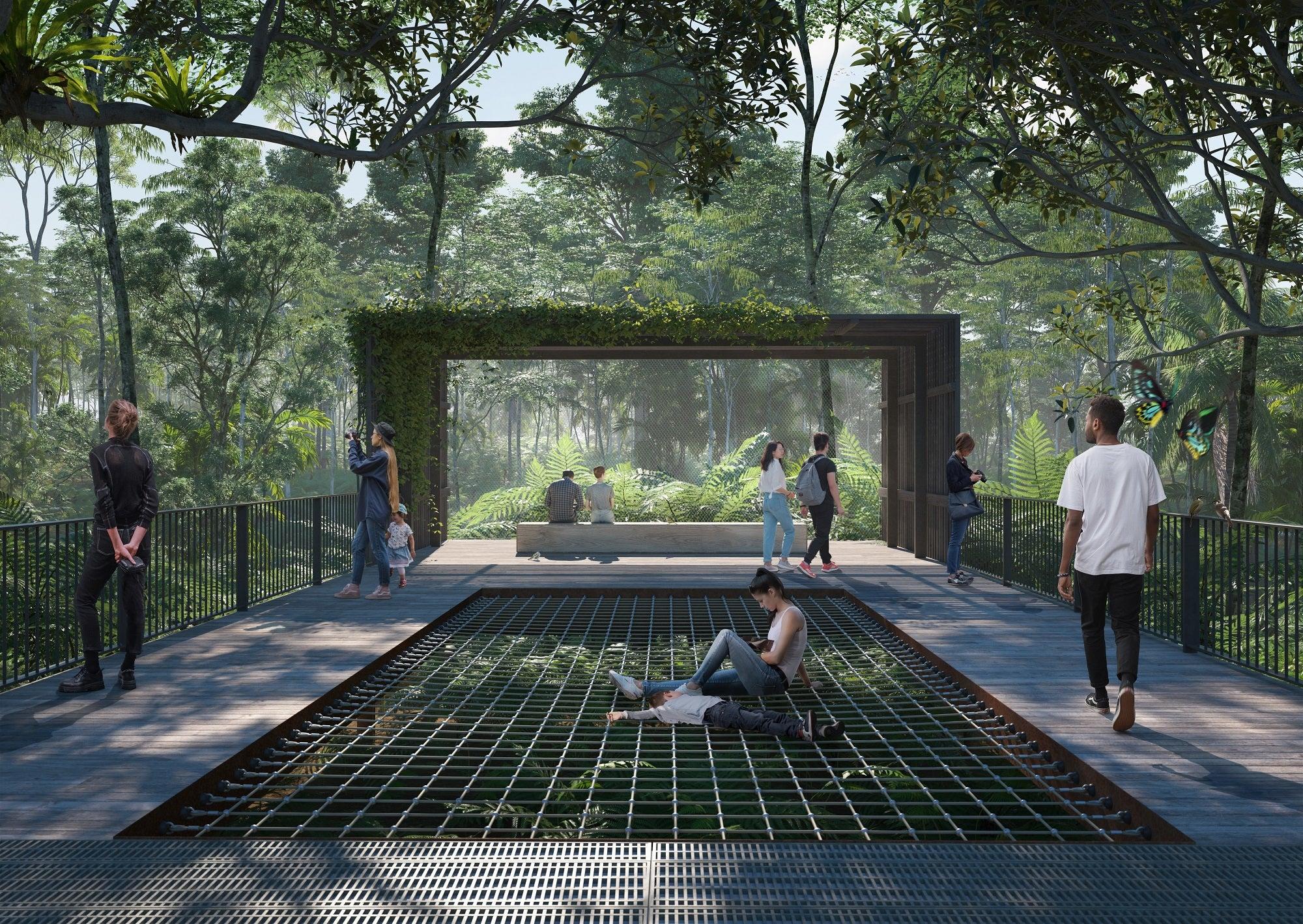Sunshine Coast Ecological Park
Sunshine Coast Council has commenced the next phase of planning to establish the Sunshine Coast Ecological Park, creating a place of cherished nature and ecological wonder for generations to discover and enjoy.
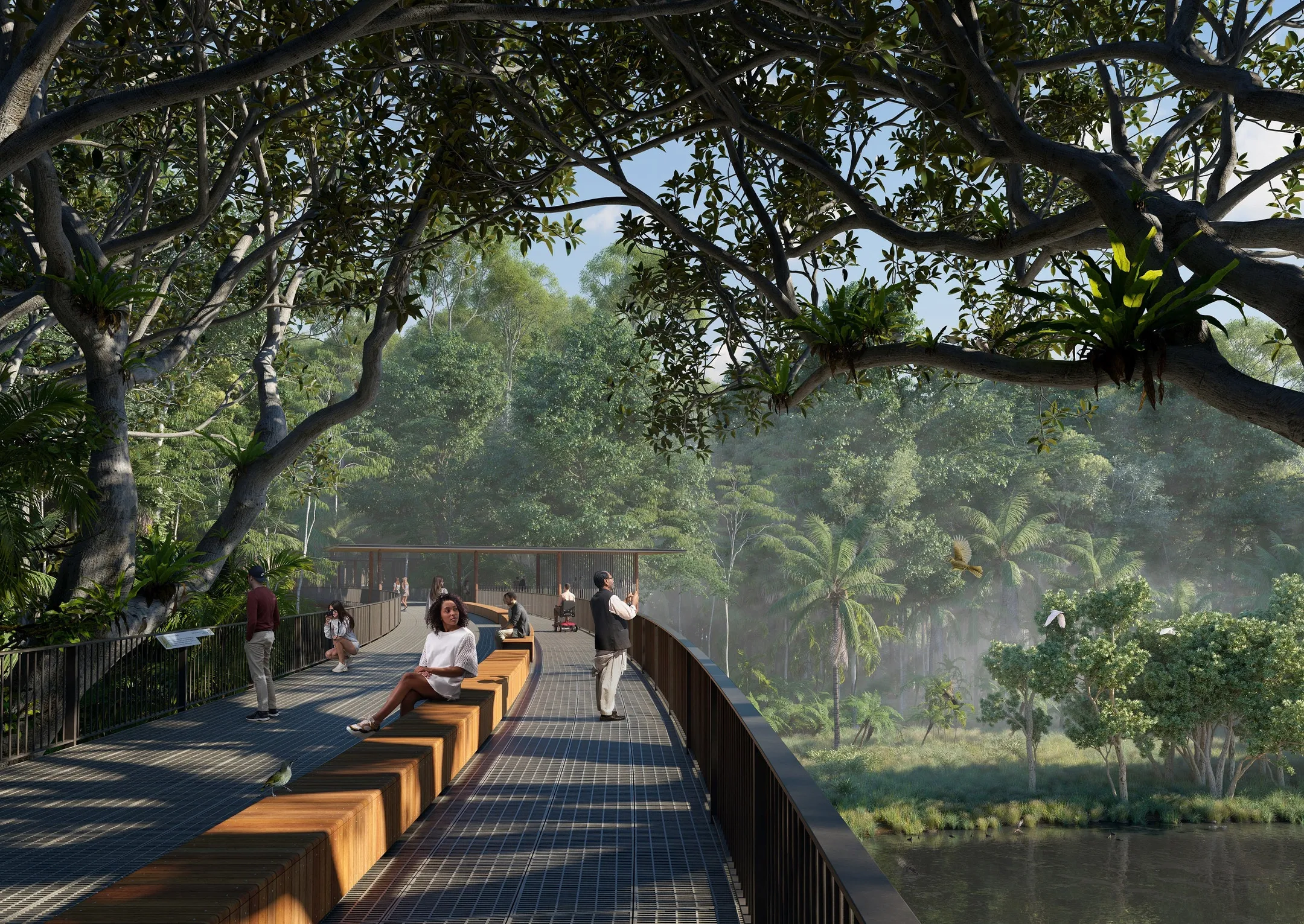
About the project
The Sunshine Coast Ecological Park project aims to restore, celebrate and protect a 65-hectare site on Jinibara Country, adjoining Maleny’s Mary Cairncross Scenic Reserve.
An ecological park considers people, wildlife, resources and vegetation equally, balancing recreation with ecological restoration.
Over decades the cleared pasture site will be transformed into a place for our community to connect with nature and each other.
The park will protect, celebrate, and restore the site’s environmental values and support nature-based recreation, education, and research, including Cultural Heritage.
It will feature high level nature conservation and sustainability outcomes and offer locals and visitors the opportunity to experience nature and culture in a responsible and respectful way.
The park will inspire ongoing care and respect for our environment, community and culture for generations to come, creating a legacy that extends far beyond the park’s boundaries.
The master plan
Following extensive community engagement, the park’s Master Plan was endorsed by Council in July 2023.
Highlights proposed include walking trails, a forest lookout tower, treetop boardwalks, spaces for events, a community hub, facilities for research, and revegetation of more than 70 per cent of the site.
You can explore the full master plan here.
Next steps
This significant project represents a once-in-a-generation opportunity to strengthen, expand and protect our region’s green space and biodiversity now, and for our future, and integrate unique cultural and recreational experiences.
Our community will have many opportunities to play an integral role in the park’s restorative process and connect more strongly with the land and each other.
This will be achieved through knowledge sharing, collaboration, sustainability initiatives such as planting days, research, cultural education and events, volunteering, community celebrations and more.
Due to its scale and scope, the park will be developed in phases, as funding and partnership opportunities become available.
Early site investigations and design planning phase (2024-2029)
The initial implementation focus includes:
- Early site investigations and research
- Early revegetation activities
- Design development for elements of the Master Plan
- Exploring potential partnership and funding opportunities
- Identifying ongoing and future opportunities for our community to be involved.
These first steps are vital in understanding the site and realising the successful long-term delivery of the environmental and recreational precinct.
Future phases of the Master Plan will be dependent on the outcome of funding and partnership opportunities.
Stay up to date with the latest park news by subscribing to email updates.
Download the latest Project Newsletter (PDF, 4.3MB).
Frequently asked questions
How was the land for the park acquired?
How was the land for the park acquired?
Council acquired the 65-hectare parcel of land between 2016 and 2018. Four rural lots were purchased using funds from the Sunshine Coast Council Environment Levy and Local Government Infrastructure Program (Parks and Land for Community Facilities).
How has Council consulted the community?
How has Council consulted the community?
The Master Plan was developed through three phases of co-design with the wider community.
Between 2022 and 2023, Council shared information and sought feedback from the community on the values, key strategies, proposed activities and precinct concepts leading to the finalised master plan.
In addition to community consultation activities, an excellence advisory panel and community reference group were established and helped inform the development of the master plan.
View the Have Your Say website here.
How have Jinibara peoples been involved with the project?
How have Jinibara peoples been involved with the project?
The Jinibara peoples are the determined native title holders for the area that incorporates the ecological park.
Council and Jinibara peoples share a vision that the park will be a welcoming and culturally safe space for both indigenous and non-indigenous peoples, providing grounds for truth telling, healing and cultural knowledge sharing.
Working in partnership with Jinibara Traditional Owners, the park will be a space that promotes and acknowledges the connection between land and people. It will be a place where First Nations peoples’ knowledge and practices can be understood and celebrated, benefiting both the ecology and community.
How will Cultural and Natural Heritage be integrated into the park?
How will Cultural and Natural Heritage be integrated into the park?
Educational elements will form part of the park. Signage, experiences and insertions will be utilised to tell stories of local heritage (both First Nations and European), teach sustainable practices, build meaning and connection to the place, and celebrate natural history.
What impact will the new park have on Mary Cairncross Scenic Reserve?
What impact will the new park have on Mary Cairncross Scenic Reserve?
The project provides an opportunity to expand our region’s accessible green spaces, provide a buffer and relieve some pressure from the busy Mary Cairncross Scenic Reserve (MCSR) and other major parks in our region.
The park will complement the mosaic of ecosystems with MCSR and safeguard the existing old growth forest.
MCSR Staff and volunteers will play a vital role in the delivery of the new ecological park through shared local knowledge and experiences.
Will there be connections to other places from the park?
Will there be connections to other places from the park?
Embedding the park into the community and its surrounding will boost the region’s open space network and natural amenity. Opportunities to connect the park through active transport links to other walking trails, the Maleny Town Centre and other local retail centres will continue to be explored with the relevant authorities.
How will the park balance the needs of nature and the community?
How will the park balance the needs of nature and the community?
This ecological park concept explores the idea of co-habitation, which fosters a relationship within living systems that share the same place. It is critical we expand open space design beyond a human-centric approach and create a shared space for all species: a place where we all care for Country.
The park will create opportunities for people of all ages to learn, pause, engage and reflect on their personal relationship with the environment and help foster a stronger connection.
Over 70 per cent of the ecological park site will be revegetated to ensure ecosystems can flourish.
How does the park benefit our community?
How does the park benefit our community?
The project’s environment, social and economic benefits extend far beyond the Sunshine Coast’s boundaries. The legacy of the park will benefit the local community and extend to future generations along with South East Queensland’s biodiversity, community health and wellbeing, an enhanced tourism reputation, economic benefits, a deeper understanding of First Nations Culture by residents and visitors and a place which is recognised as welcoming and accessible for all.
What sustainability initiatives will be applied in the park?
What sustainability initiatives will be applied in the park?
The park aims to be a beacon of environmental sustainability. Environmental excellence will be applied to all aspects of planning, construction and operation supported by community involvement and stewardship. Best practice principles including restoration, reuse and rehabilitation will be adopted.
Has Climate Change been considered as part of the project?
Has Climate Change been considered as part of the project?
Council recognises climate change as a global issue and that we are in a state of climate emergency requiring urgent and sustained effort. We also recognise that responding to climate change is a shared responsibility. The Sunshine Coast Ecological Park forms part of Council’s efforts to focus our efforts and change our behaviours to increase the resilience of our region.
Will the park be accessible for people of all ages and abilities?
Will the park be accessible for people of all ages and abilities?
Accessibility is a key feature to ensure all people, including those with mobility issues or disabilities are able to enjoy and appreciate the park’s features, amenities, and natural beauty, including a universal design/accessible tree top bridge, loop path and a diverse range of pathways that cater to the needs of all ages and abilities, including opportunities for buggy access to remote park destinations to allow people with disabilities and the elderly to experience key park elements.
How will transport and parking be managed?
How will transport and parking be managed?
Traffic and parking will form an important part of the design and planning process to ensure minimal impact to the surrounding road network and neighbouring properties while still permitting community access to the park.
Council will undertake investigations to understand potential traffic impacts, flow and access.
Community feedback through the community engagement process has also been considered in developing the master plan.
Community gathering spaces and infrastructure will be centralised in the heart of the park to allow the majority of the park to play a more passive and ecological role.
How can I be involved?
How can I be involved?
Our community will have many opportunities to play an integral role in the park’s restorative process and connect more strongly with the land and each other. This will be achieved through knowledge sharing, collaboration, environmental sustainability initiatives such as planting days, research, cultural education and events, volunteering, community celebrations and more. The best way to learn how to be involved in the park’s evolution is by subscribing for project updates via the button on the home page.
I have more questions. How can I get in touch with the project team?
I have more questions. How can I get in touch with the project team?
For more information on the ecological park, you can email [email protected].
Resource Library
Project newsletter - September 2024 (PDF, 4.35MB)
Sunshine Coast Ecological Park Master Plan (PDF, 102.65MB)
Masterplan Community Consultation – Stage 3 Findings (PDF, 262KB)
Masterplan Community Consultation – Stage 2 Findings (PDF, 262KB)
Masterplan Community Consultation – Stage 1 Findings (PDF, 156KB)
This project is contributing to our Sunshine Coast Biosphere.

